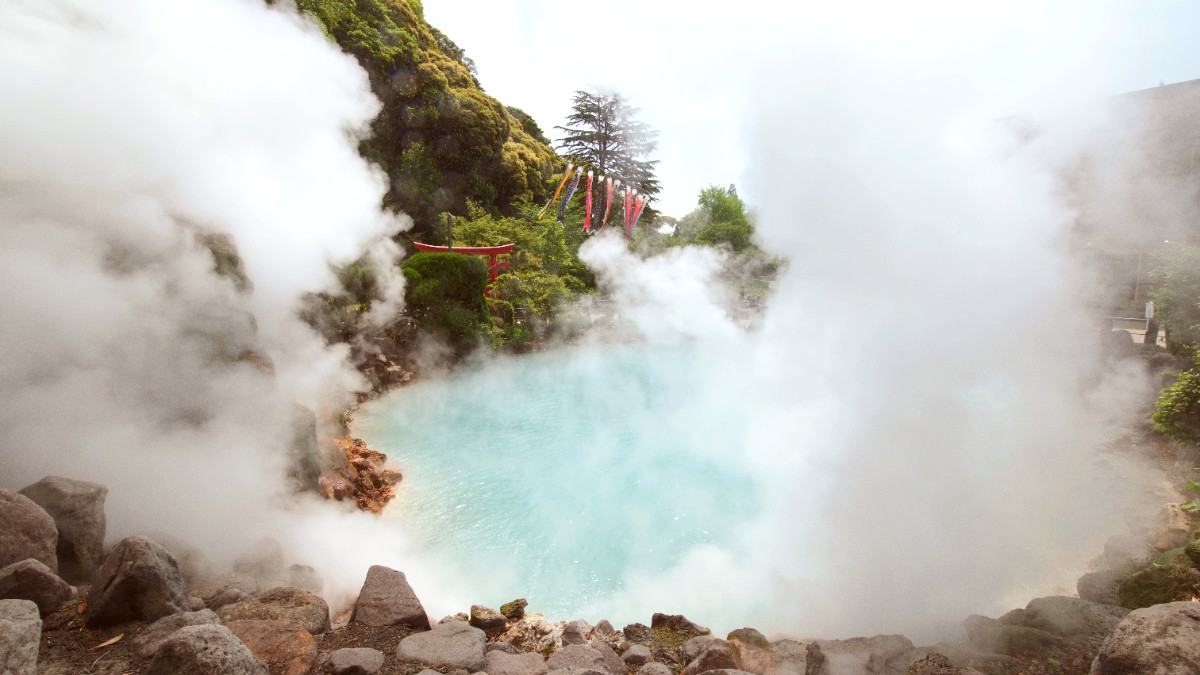
Kyushu, Japan
Spring (March-May): Temperatures typically range from 10°C to 20°C (50-68°F). The weather is mild and pleasant with moderate rainfall. This season brings comfortable conditions for sightseeing and outdoor activities.
Autumn (September-November): Temperatures range from 15°C to 25°C (59-77°F). This season is generally pleasant, with clear skies and comfortable humidity levels. Autumn foliage creates beautiful scenery.
Onsen Bathing: Enjoyable year-round. Onsen bathing feels especially atmospheric and relaxing during the cooler months of autumn and winter.
Hiking (e.g., Mt. Tsurumi, Mt. Yufu): Spring and autumn hold the most comfortable temperatures and clearest views for hiking. Cherry Blossom Viewing: Late March to early April. Autumn Foliage: Late October to mid-November. Beach Activities: Summer is the perfect time for activities like the Beppu Beach Sand Bath.
Spring (late March - early May), Autumn (late October - November)
Many festivals occur. Weather is beautiful.
Attractions become crowded, accommodation prices rise. Book well in advance. Golden Week (early May) sees heavy domestic travel.
May (after Golden Week), September (after summer heat/typhoons)
Weather good, crowds fewer, prices more reasonable.
Early September may still bring some rain or residual typhoon effects.
June-July (rainy season), January-February (coldest months)
Fewer tourists, more peaceful visits, lower prices for accommodations/flights. Onsen experiences atmospheric during colder weather.
High humidity and frequent rain characterize summer. Winter brings colder temperatures. Some smaller attractions may have reduced hours.
Rainy Season (Tsuyu): Early June to mid-July sees frequent rain, high humidity, and overcast skies. Carry a Compact umbrella or a Lightweight rain jacket. Summer Heat: July and August feel very hot and humid. Plan outdoor activities for early mornings or late afternoons. Stay hydrated and use Sun protection.
Typhoon Season: August to October. Typhoons bring heavy rain, strong winds, and cause transportation disruptions. Monitor local weather forecasts closely if traveling during this period. Local authorities issue warnings, and transportation services may halt for safety.
Especially atmospheric in autumn and winter.
Spring and autumn are most comfortable.
Late March to early April.
Late October to mid-November.
Summer is perfect for sand baths.
Japan maintains clear entry requirements for foreign visitors. Most tourists find the process straightforward due to Japan's visa exemption policies.
Japan has visa exemption arrangements with many countries for short-term tourism. This includes citizens of the United States, Canada, most European Union countries, Australia, and New Zealand. Visa-free stays typically range from 15 to 90 days. Confirm your country's specific visa requirements on the Japanese Ministry of Foreign Affairs website.
Always have these documents ready for immigration.
Beppu extends experiences for various budgets, from frugal backpacking to luxurious indulgence. Japan's currency is the Japanese Yen (JPY, ¥). Credit cards are widely accepted, but cash is useful for smaller shops and local eateries.
Luxurious indulgence is possible too, with higher daily costs for premium experiences.
Accommodations (per night): Hostel/Guesthouse (dorm bed): ¥2,500 - ¥4,000. Business Hotel (single/double): ¥5,000 - ¥10,000. Mid-range Ryokan/Hotel (per person, often with meals): ¥8,000 - ¥20,000. Luxury Ryokan/Hotel (per person, often with meals): ¥20,000+.
Meals (per meal): Street Food/Convenience Store: ¥300 - ¥1,000. Casual Restaurant/Ramen: ¥700 - ¥1,500. Mid-range Restaurant/Izakaya: ¥2,000 - ¥5,000. Fine Dining/Kaiseki: ¥5,000+.
Utilize local buses: Beppu's bus network covers most tourist sites. Consider purchasing a Kamenoi Bus "My Beppu Free Pass" for unlimited rides for 1 or 2 days.
Some versions include access to the Beppu Ropeway, a good value.
Taxis quickly become expensive for longer distances.
Eat at local eateries and supermarkets: Shokudo (casual diners), ramen shops, and udon shops hold delicious and affordable meals. Look for bentos at supermarkets for cheap dinner options.
Convenience stores have a wide range of inexpensive, ready-to-eat food.
Fine dining expenses pile up quickly.
Prioritize public onsen: Many local onsen are very inexpensive, some as low as ¥100-¥200, offering an authentic bathing experience without the high cost of a private ryokan.
Consider a combined ticket for Beppu Hells (¥2,200 for 7 Hells).
Do not feel obligated to leave extra money when tipping; it is not customary in Japan.
| Category | Budget Traveler (¥) | Mid-Range Traveler (¥) |
|---|---|---|
| Accommodation | 2,500-4,000 | 6,000-15,000 |
| Meals | 1,500-3,000 | 3,000-7,000 |
| Transportation | 500-1,000 | 1,000-2,000 |
Beppu, like the rest of Japan, is safe. Yet, awareness of health considerations and potential natural hazards helps travelers prepare for a comfortable and secure trip.
No specific vaccinations for entry. Routine vaccinations (MMR, DTaP) should be up-to-date. Consult a travel health clinic for recommendations like Hepatitis A/B, Japanese Encephalitis, Rabies.
Low risk due to high hygiene standards. Tap water is safe. Maintain good hand hygiene.
Common in winter. Practice hand hygiene. Consider wearing a mask in crowded indoor spaces.
Sunburn/Heatstroke: During summer, protect yourself from strong sun and high humidity. Stay hydrated by drinking plenty of water, use Sunscreen, and wear hats. Seek shade during the hottest parts of the day.
Injuries: Pay attention to uneven surfaces, especially around natural attractions or older onsen areas. Wear comfortable, sturdy shoes.
Allergies: If you have severe allergies, carry an allergy card translated into Japanese.
Food hygiene standards are very high across Japan. Eating street food or at local restaurants is generally safe.
Beppu Medical Center provides comprehensive services. Language support can be limited. Prepare a Translation app or phrasebook.
Easily found. You can purchase many common over-the-counter medications. For prescription medications, bring a doctor's note and confirm legality for import.
Police: 110. Fire/Ambulance: 119. Japan Helpline: 0570-000-911 for interpretation.
Japan experiences natural phenomena.
Japan maintains one of the lowest crime rates in the world. Beppu is a very safe city. Petty crime is rare but possible in crowded tourist areas.
Japan's crime rates are among the lowest globally. Exercise standard precautions.
Specific safety concerns by neighborhood generally do not apply for Beppu. You find security walking alone, even at night.
Tap water is safe. Food hygiene standards are high. Food poisoning incidents are rare.